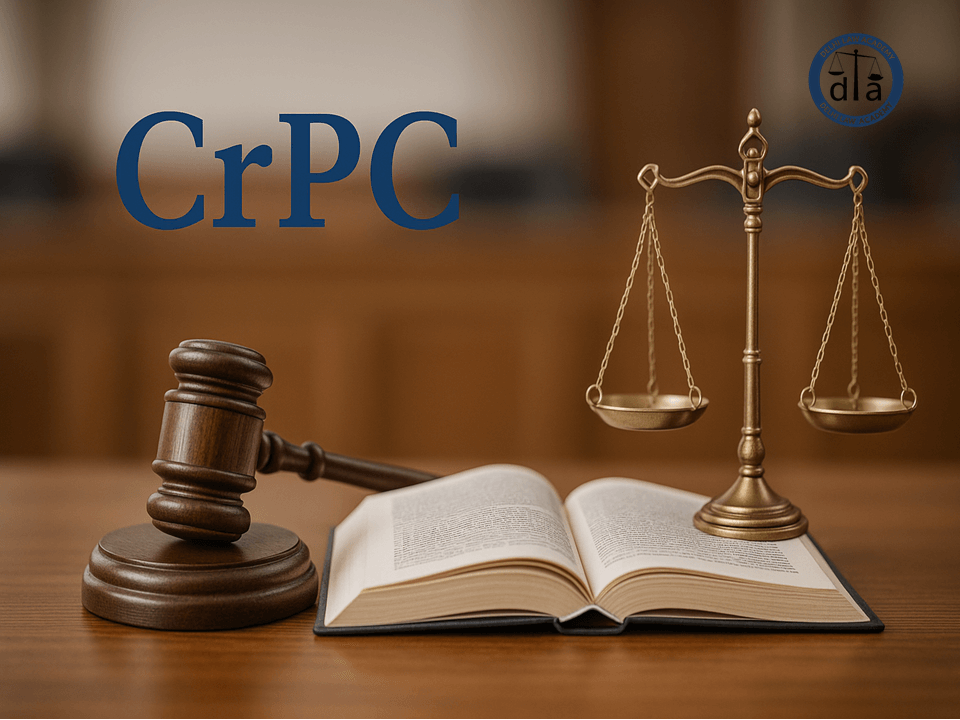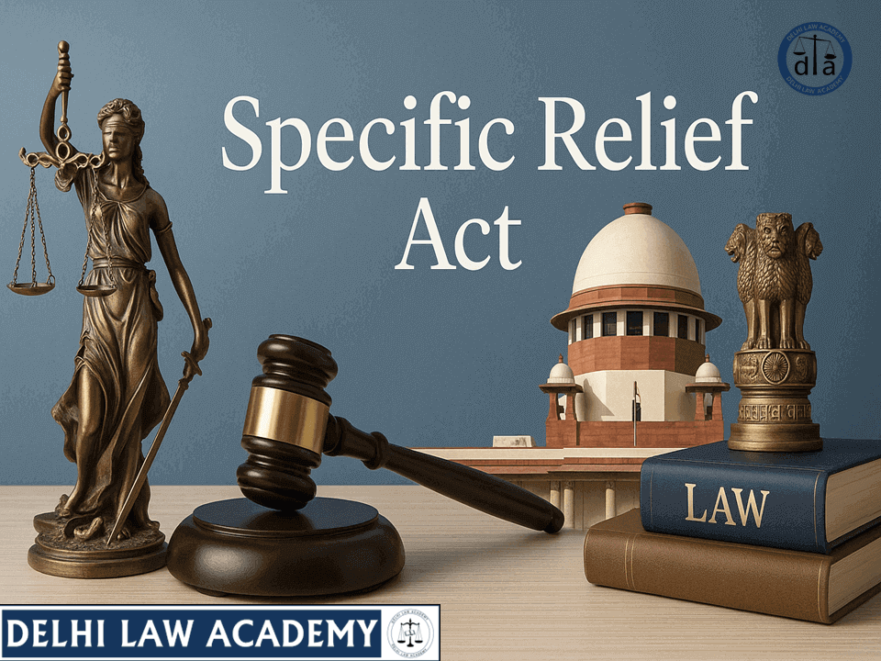
⚖️ CRIMINAL PROCEDURE: MAINTENANCE OF WIVES, CHILDREN AND PARENTS
📚 TOPICS
- Nature of proceedings u/s 125
- “Wife unable to maintain herself”: Burden of proof:
- “Husband had sufficient means”: Burden of proof:
- Whether a man and woman living together for a long time, without a valid marriage, would raise a presumption of a valid marriage entitling the woman to maintenance?
- Standard of proof of marriage
- Status of the second wife in a bigamous marriage
- Status of a kept-mistress
🏛️ LANDMARK CASES decided by the SUPREME COURT and the Privy Council
- Rajathi v. C. Ganesan [1999 SC]
- Dwarika Prasad Satpathy v. Bidyut Prava Dixit [1999 SC]
- Badshah v. Urmila [2013 SC]
- Vimala v. Veeraswamy [1991 SC]
- A. Dinohamy v. W.L. Balahamy [1927 P.C.]
🎯 Preparation for RJS, DJS, PCS (J) and other Judicial Service Exams
CRIMINAL PROCEDURE CODE EXPLAINED
The Criminal Procedure Code forms the bedrock of any and every Judicial Service exam in the country. Its thorough knowledge is a must for all aspirants of RJS, DJS, PCS (J) and every other Judicial Service exam. To help such aspirants, DELHI LAW ACADEMY JAIPUR has launched a series of study material modules on all important aspects of this vital part of their syllabus:
📖 Section 125 (1) – Maintenance of Wives, Children and Parents
- If any person having sufficient means neglects or refuses to maintain:
- his wife, unable to maintain herself
- his legitimate or illegitimate minor child, whether married or not, unable to maintain itself
- his legitimate or illegitimate major child, not being a married daughter, unable to maintain itself by reason of any physical or mental abnormality or injury
- his father or mother, unable to maintain himself or herself
- a Magistrate of the first class may order such person to make a monthly allowance for maintenance at such monthly rate as such Magistrate thinks fit
- Magistrate may order father of a married minor female child to make such allowance until she attains her majority if satisfied that the husband of such minor female child is not possessed of sufficient means
Explanation:
“wife” includes a woman who has been divorced by or has obtained a divorce from her husband and has not remarried.
⚖️ Section 125 (3)
- If any person so ordered fails without sufficient cause to comply with the order, Magistrate may for every breach of order issue a warrant for levying the amount as if fine and sentence such person to imprisonment up to one month or until payment if sooner made.
- For each month’s allowance remaining unpaid after execution of warrant.
Relevant provision of CrPC for issue of warrant for levy of fine:
Section 421
• When an offender has been sentenced to pay a fine:
• Court may take action for recovery of the fine in either or both of the following ways:
– it may issue a warrant for the levy of the amount by attachment and sale of any moveable property belonging to the offender
– it may issue a warrant to the collector of the district authorising him to realise the amount as arrears of land revenue from the movable or immovable property or both of the defaulter
⚖️ Section 125 (4)
- No wife shall be entitled to receive from her husband an allowance for maintenance or interim maintenance and expenses of proceedings if she is living in adultery or she refuses to live with her husband without any sufficient reason or they are living separately by mutual consent.
(1) Nature of proceedings u/s 125
• Proceedings u/s 125 are of summary nature.
• This Section is meant to provide immediate relief to the wife, minor children and parents, who are unable to maintain themselves.
(2) “Wife unable to maintain herself”: Burden of proof:
• The words “unable to maintain herself” would mean that means available to the deserted wife while she was living with her husband and would not take within itself the efforts made by the wife after the desertion to survive somehow.
• Statement of the wife that she is unable to maintain herself would be enough and it would be for the husband to prove otherwise.
(3) “Husband had sufficient means”: Burden of proof:
• Section 125 is enacted on the premise that it is the obligation of the husband to maintain his wife, children and parents.
• It will, therefore, be for him to show that he has no sufficient means to discharge his obligation and that he did not neglect or refuse to maintain them or any one of them.
• All evidence to such proceedings shall be taken in presence of the person against whom an order for payment of maintenance is proposed to be made and shall be recorded in the manner prescribed for summons cases.
💬 Question:
Whether a man and woman living together for a long time, without a valid marriage, would raise a presumption of a valid marriage entitling the woman to maintenance?
Ans: This question was referred to a larger Bench by a 2-Judge Bench in .
A broad and expansive interpretation should be given to the term ‘wife’ to include even those cases where a man and woman have been living together as husband and wife for a reasonably long period of time….
📜 Standard of proof of marriage
The standard of proof of marriage in a section 125 proceeding is not as strict as is required in a trial for an offence u/s 494 IPC. An order passed in an application u/s 125 does not really determine the rights and obligations of parties as the section is enacted with a view to provide a summary remedy to neglected wives to obtain maintenance.
If the claimant in proceedings u/s 125(1) succeeds in showing that she and the respondent have lived together as husband and wife, the court can presume that they are legally-wedded spouse, and in such a situation, the party who denies the marital status can rebut the presumption.
👩⚖️ Status of the second wife in a bigamous marriage
Marriage between the petitioner and respondent was solemnized; respondent co-habited with the petitioner after the marriage, a child was begotten out of the said co-habitation, whose biological father was the petitioner. At the time when the petitioner married the respondent, he had a living wife and the said marriage was still subsisting.
Question: Whether in such circumstances, the respondent could file an application u/s 125(1)?
Ans: The provision of maintenance would definitely fall in this category which aims at empowering the destitute and achieving social justice or equality and dignity of the individual.
💔 Status of a kept-mistress
…the object is to prevent vagrancy and destitution. It provides a speedy remedy for the supply of food, clothing and shelter to the deserted wife. When an attempt is made by the husband to negative the claim of the neglected wife depicting her as a kept-mistress on the specious plea that he was already married, the court would insist on strict proof of the earlier marriage.
The term ‘wife’ in Section 125 includes a woman who has been divorced by a husband or who has obtained a divorce from her husband and has not remarried. The woman not having the legal status of a wife is thus brought within the inclusive definition of the term ‘wife’ consistent with the objective…
Thus, in those cases where a man, who lived with a woman for a long time and even though they may not have undergone legal necessities of a valid marriage, should be made liable to pay the woman maintenance if he deserts her.
Where a man and woman are proved to have lived together as man and wife, the law will presume, unless, the contrary is clearly proved, that they were living together in consequence of a valid marriage, and not in a state of concubinage.
📚 Continue Your CrPC Preparation
Don’t stop here! Strengthen your knowledge of CrPC with our other fully solved tests:
📘 Free Study Material for Judiciary Aspirants!
Download our FREE study material prepared by Delhi Law Academy’s expert faculty.
📌 Frequently Asked Questions: Maintenance of Wives, Children and Parents
Section 125(1) CrPC provides maintenance for wives, minor or major children, and parents unable to maintain themselves. A Magistrate may order a monthly allowance from a person with sufficient means.
The wife only needs to state she is unable to maintain herself. The husband has the burden to prove otherwise.
It is the husband’s obligation to maintain his wife, children, and parents. He must show he lacks sufficient means or did not neglect them. All evidence is taken in his presence.
Yes. If a man and woman live together for a reasonable long time as husband and wife, she may claim maintenance. Courts interpret “wife” broadly.
The second wife may claim maintenance if she is deserted. The provision aims to protect the destitute.
The court may consider her claim if she lived long-term with the man and was deserted. Strict proof is required regarding any prior legal marriage.
Contact us
📍 Delhi Law Academy – Jaipur Branch
6C, Tower 2, Coaching Hub, Pratap Nagar, Jaipur – 302033
📞 Phone:
+91 9911916552
+91 8447285606
✉️ Email:
contactus@delhilawacademy.com

